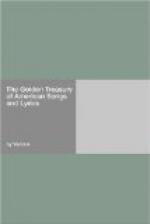And this was the reason that, long ago,
In this kingdom by the sea,
A wind blew out of a cloud, chilling
My beautiful Annabel Lee;
So that her highborn kinsmen came
And bore her away from me,
To shut her up in a sepulchre
In this kingdom by the sea.
The angels, not half so happy in heaven,
Went envying her and me;
Yes, that was the reason (as all men know,
In this kingdom by the sea)
That the wind came out of the cloud by
night,
Chilling and killing my Annabel
Lee.
But our love it was stronger by far than
the love
Of those who were older than
we,
Of many far wiser than we;
And neither the angels in heaven above,
Nor the demons down under
the sea,
Can ever dissever my soul from the soul
Of the beautiful Annabel Lee.
For the moon never beams, without bringing
me dreams
Of the beautiful Annabel Lee;
And the stars never rise, but I feel the
bright eyes
Of the beautiful Annabel Lee;
And so, all the night-tide, I lie down
by the side
Of my darling,—my darling,—my
life and my bride,
In her sepulchre there by
the sea,
In her tomb by the sounding
sea.
E.A. POE.
A Health.
I fill this cup to one made up
Of loveliness alone,—
A woman, of her gentle sex
The seeming paragon;
To whom the better elements
And kindly stars have given
A form so fair, that, like the air,
’Tis less of earth than
heaven.
Her every tone is music’s own,
Like those of morning birds;
And something more than melody
Dwells ever in her words;
The coinage of her heart are they,
And from her lips each flows
As one may see the burden’d bee
Forth issue from the rose.
Affections are as thoughts to her,
The measures of her hours;
Her feelings have the fragrancy,
The freshness of young flowers;
And lovely passions, changing oft,
So fill her, she appears
The image of themselves by turns,—
The idol of past years!
Of her bright face one glance will trace
A picture on the brain;
And of her voice in echoing hearts
A sound must long remain,
But memory, such as mine of her,
So very much endears,
When death is nigh, my latest sigh
Will not be life’s,
but hers.
I fill this cup to one made up
Of loveliness alone,—
A woman, of her gentle sex
The seeming paragon.
Her health! and would on earth there stood
Some more of such a frame,
That life might be all poetry,
And weariness a name.
E.C. PINKNEY.
A Serenade.
Look out upon the stars, my love,
And shame them with thine
eyes,
On which, than on the lights above,
There hang more destinies.
Night’s beauty is the harmony
Of blending shades and light:
Then, lady, up,—look out, and
be
A sister to the night!




